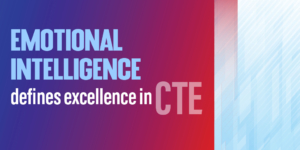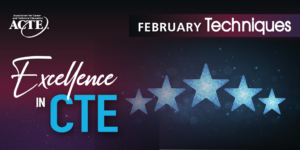“What skills do your employees need most?” The common answers heard across the nation are communication, professionalism, openness to feedback and the ability to take initiative.

Many of the skills deemed essential by the U.S. Department of Education deemed essential fall under the umbrella of emotional intelligence (EI).
- Applied academic skills
- Interpersonal skills
- Personal qualities
- Technology use
- Systems thinking
- Communication skills
- Information use
- Resource management
- Critical thinking skills
Why is emotional intelligence important?
The modern workforce requires proficiency in technical skills as well as in empathy, resilience, communication and active listening. The intentional integration of employability skills development within career and technical education (CTE) programs is starting to bridge achievement gaps. Research has shown that EI, defined as “the ability to perceive, manage and regulate emotions,” can have a profound impact on a learner’s academic achievement (Quílez-Robres et al., 2023). Thus, integrating emotional intelligence within CTE promises to cultivate meaningful relationships and a more dynamic, responsive and empathetic learning environment.
After IMAGO’s recent experience at ACTE’s CareerTech VISION 2023, we feel affirmed that our nation’s thought leaders are challenging the status quo and creatively infusing emotional intelligence into their programs. Together, we unite in paving the way for a more emotionally intelligent future. Our greatest opportunities lie in addressing our shortcomings. At VISION, we asked more than 100 administrators and teachers about college and career readiness and what their students need more of to excel. Let their insight be a call to action, urging us to refine our educational approaches and better equip our students for success.
CTE educators are acting to integrate EI effectively. We asked VISION attendees, “What innovative strategies is your district implementing in the realm of human development?” The ensuing dialogue was promising, shedding light on how emotional intelligence is transforming the student experience.
AI to measure emotional intelligence
The Anaheim Union High School District (AUHSD) in Southern California, champions the integration of EI as a cornerstone of student development. “The vision of our Superintendent Matsuda is founded on five Cs: collaboration, communication, compassion, critical thinking and creativity,” shared Jason Collar, community schools lead at the district.
“Not only are we reimagining traditional educational approaches, but we are now leveraging artificial intelligence (AI) to help measure understanding and application of emotional intelligence, through a partnership with the Chan Zuckerberg Foundation. Rather than conventional tests, students showcase their understanding through dynamic methods like chalkboard writings and screen-recorded presentations to demonstrate learned content and retention in more creative ways.”
Fit Fridays
Ohio’s Butler Tech is breaking away from the traditional full-day academic model. Assistant Superintendent William Sprankles reflects on how CTE students are often limited to half-day programs. And they may miss out on quintessential high school experiences, like homecoming or football games, due to scheduling. To address this, the district introduced Fit Fridays. These days aren’t about regular classes; instead, they offer a variety of activities based on student interests and teacher collaboration, ranging from Taekwondo to cooking, and culminating in events like chicken wing contests or DJ showcases.
This approach can, however, spark debate among educators. Some argue for using these days to advance standard curricula, emphasizing the importance of traditional learning. This encapsulates a broader educational dilemma: the tension between experiential learning and traditional academic rigor. Fit Fridays’ proponents say they exemplify a bold step toward enriching students’ educational journeys, balancing academic demands with real-world experiences.
Relationship-building
At Sahuarita Unified School District (SUSD), in Arizona, the first week of school is uniquely dedicated to building relationships between teachers and students, setting a foundation for the rest of the academic year. This period is devoid of traditional academic content, focusing instead on various engaging activities designed to share each others’ interests, goals and fun facts. Teachers may inquire about students’ pets, their aspirations for high school and beyond, and what excites them. These discussions are not just icebreakers; they are part of a strategic effort to connect with each student on a personal level.
Dedicating time to relationship-building is a choice that will pay dividends throughout the academic year. It emphasizes the crucial role of empathy, understanding and personal connection. This approach not only enhances the learning experience but also contributes to a more respectful and cohesive classroom environment. Throughout the year, the information gathered during this first week becomes a powerful tool for teachers. It allows them to tailor their teaching methods and interactions based on what they know about each student. This strategy highlights the importance of recognizing individuals’ unique backgrounds and interests, creating a more inclusive and effective educational environment. When educators prioritize relationships, students may feel more valued and become more engaged.
Conclusion
As we reflect on the innovative approaches highlighted in this exploration of CTE, we see a clear, transformative path unfolding in education. These examples showcase how integrating emotional intelligence into CTE enhances employability skill development and improves classroom engagement. These educators demonstrate a unique ability to adapt and equip students with critical life skills. By implementing educational experiences that are academically rigorous and emotionally enriching, we can better prepare students for success.
Edgar Blunt is CEO and co-founder of IMAGO. He wants to live in a world filled with happy and fulfilled humans. In this world, karaoke happens on more days than it doesn’t. And there is always room at the table for another friend. With more than 25 years of experience in workforce and human development, Blunt has worked alongside school districts, workforce agencies, and businesses to explore and improve the ways we approach our lives.
Dalia Haitayan, Ph.D., is head of research at IMAGO. She completed her doctorate in history from Boston University in 2023. Specializing in 20th century U.S. political and racial history, Haitayan is driven by her passion to infuse history with curricula on emotional intelligence. She seeks to demonstrate the transformative power of historical knowledge in fostering inclusive and equitable learning environments.








